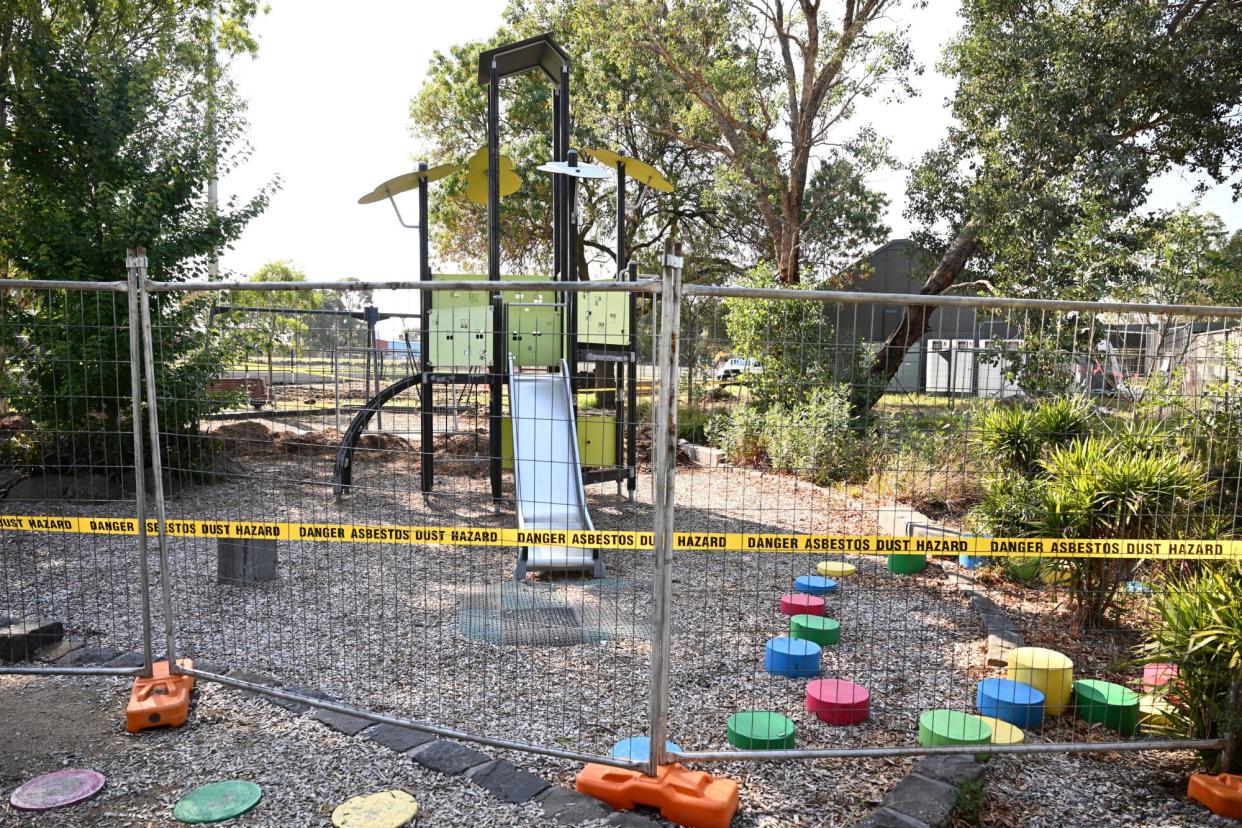Asbestos discovered at three more Melbourne parks, says local council

Victoria’s environment watchdog says it suspects an illegal dumping of construction waste was behind the discovery of asbestos in mulch in Melbourne’s west this week.
But the spread of asbestos could be broader than first suspected, with Hobsons Bay city council, in the city’s west, confirming late on Friday that three further sites have been identified.
Asbestos-containing material was initially found in mulch next to a playground in Donald McLean Reserve in Spotswood on Monday.
Asbestos was then also discovered in soil at a second park in the city’s north, with Merri-bek city council on Friday confirming the detection at Hosken Reserve in Coburg North, after an earlier discovery in late January.
On Friday, the Victorian Environment Protection Authority said it had identified other parks in the city’s west that received mulch from the same source as that used in Spotswood.
“Testing results have confirmed the only site with traces of asbestos is Donald McLean Reserve. Material from all other sites tested negative for asbestos,” the EPA said in a statement.
The EPA said the issue was localised to the one site and believed “illegal dumping of construction and demolition waste” that occurred after the mulch was delivered was the source of the contamination.
However, late on Friday, a statement from Hobsons Bay Council contradicted the EPA’s findings, saying it had detected asbsetos at three more public parks.
“Hobsons Bay City Council is closing areas at three additional reserves after testing confirmed the presence of asbestos-containing material,” the council said in a statement.
“Sections of Crofts Reserve, Hosken Reserve and Lynch Reserve, all in Altona North, will be closed until further notice. Recycled mulch from these reserves was sent for testing, following the recent findings at Donald McLean Reserve in Spotswood.”
The statement said the council would work with a material hygienist and the EPA to undertake remediation works on all of the sites.
”
It said the materials discovered at the reserve were bonded asbestos, which is considered low-risk for people in contact with it unless it is damaged or badly weathered.
In a statement earlier on Friday, Merri-bek council said the “majority of the site” at Hosken Reserve had been closed to the public since asbestos was first discovered there in January.
Related: Asbestos found in recycled mulch next to playground in Melbourne’s west
“Following this discovery, appropriate measures were taken to ensure the contaminated soil was removed, the site was safe and local residents were notified,” they said.
“During more recent landscaping works, further asbestos-contaminated soil was discovered. This contaminated soil is now being removed by competent and qualified asbestos removalists and is expected to be completed by Friday 31 May.”
Throughout the removal works, air monitoring will be conducted to ensure the safety of workers and nearby residents, the spokesperson said. Workers on site will also be required to wear personal protective equipment.
They said any soil that contains asbestos is also “sealed, under cover and is inaccessible to the public”.
The council said in both instances, the asbestos found at the reserve has been “localised to soil only”.
All asbestos found on the site was considered non-friable, which means it is solid and cannot be crumbled or released into the air, the spokesperson said.
They said there was “no evidence” it was linked to any other asbestos contamination cases across the state or nationally.
“It is a frequent occurrence in inner Melbourne that construction projects will involve discovery of centuries-old or decades-old contamination, which can then be appropriately dealt with under standards and guidelines,” they said.
On Wednesday, the Hobsons Bay city council in Melbourne confirmed two pieces of building material found by a resident on Monday contained asbestos.
The council said the asbestos material was discovered in a recycled mulch product around mature tree-planting. A “virgin soft mulch” was also used around the playground.
Related: NSW to double penalties for worst environmental crimes in wake of asbestos crisis
It said it has identified the supplier of the mulch but has not made this information public.
The Victorian opposition said the state government must do more to ensure the state’s parks were safe for children to play in.
“This shouldn’t happen. The government needs to come clean and tell us: are there any other playgrounds that have the same kind of risk [and] what is the government doing to mitigate the risk?” the deputy Liberal leader, David Southwick, said.
Guardian Australia has approached the government for comment.
There is heightened community concern around asbestos contamination after the discovery of bonded asbestos at more than 75 sites, including parks and schools, in New South Wales.
Queensland authorities have also identified at least 90 sites for investigation after contaminated mulch was taken from two stockpiles.
EPA Victoria has conducted precautionary inspections of 59 commercial mulch producers and said on Wednesday no traces of asbestos were found in their products.


